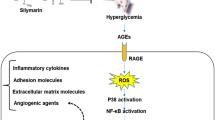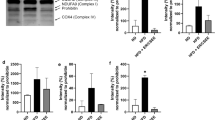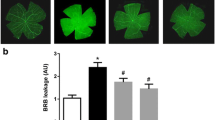Abstract
Purpose
Beneficial effects of white mulberry against diabetes mellitus have been reported. However, the molecular mechanisms of how white mulberry can attenuate diabetic retinopathy remain poorly understood. Here, the mechanism underlying the protective effect of Morus alba leaves ethanolic extract on oxidative stress, inflammation, apoptosis, and angiogenesis in diabetic retinopathy was investigated.
Methods
Diabetes was induced by injection of streptozotocin. One week after, M. alba (100 mg/kg) was administrated to the rats daily for 16 weeks.
Results
Morus alba extract showed high content of polyphenolics and free radical scavenging activity. Oral M. alba administration significantly attenuated hyperglycemia and weight loss, and decreased sorbitol, fructose, protein kinase C, pro-inflammatory cytokines, and oxidative stress markers in retinas of the diabetic rats. Moreover, M. alba produced marked down-regulation of caspase-3 and Bax, with concomitant up-regulation of Bcl-2 in the diabetic retinas. M. alba also reduced the expression of VEGF in the retina.
Conclusion
These results indicate that M. alba has protective effect on diabetic retinopathy with possible mechanisms of inhibiting hyperglycemia-induced oxidative stress, apoptosis, inflammation, polyol pathway activation, and VEGF expression in the retina.







Similar content being viewed by others
References
Aiello LP, Gardner TW, King GL, Blankenship G, Cavallerano JD, Ferris FL 3rd (1998) Diabetic retinopathy. Diabetes Care 21:143–156
Yau JW, Rogers SL, Kawasaki R et al (2012) Global prevalence and major risk factors of diabetic retinopathy. Diabetes Care 35:556–564
Aiello PL (2006) The molecular biology of diabetic retinopathy: opportunities for therapeutic intervention. Adv Stud Ophthalmol 3:8–12
Mohamed Q, Gillies MC, Wong TY (2007) Management of diabetic retinopathy: a systematic review. JAMA 298:902–916
Santos JM, Tewari S, Kowluru RA (2012) A compensatory mechanism protects retinal mitochondria from initial insult in diabetic retinopathy. Free Radic Biol Med 53:1729–1737
Mitsuhashi J, Morikawa S, Shimizu K, Ezaki T, Yasuda Y, Hori S (2013) Intravitreal injection of erythropoietin protects against retinal vascular regression at the early stage of diabetic retinopathy in streptozotocin-induced diabetic rats. Exp Eye Res 106:64–73
Chung SS, Chung SK (2005) Aldose reductase in diabetic microvascular complications. Curr Drug Targets 6:475–486
Caldwell RB, Bartoli M, Behzadian MA, El-Remessy AE, Al-Shabrawey M, Platt DH (2005) Vascular endothelial growth factor and diabetic retinopathy: role of oxidative stress. Curr Drug Targets 6:511–524
Curtis TM, Scholfield CN (2004) The role of lipids and protein kinase Cs in the pathogenesis of diabetic retinopathy. Diabetes Metab Res Rev 20:28–43
Aiello LP, Bursell SE, Clermont A et al (1997) Vascular endothelial growth factor-induced retinal permeability is mediated by protein kinase C in vivo and suppressed by an orally effective beta-isoform-selective inhibitor. Diabetes 46:1473–1480
Vinores SA, Van Niel E, Swerdloff JL, Campochiaro PA (1993) Electron microscopic immunocytochemical demonstration of blood-retinal barrier breakdown in human diabetics and its association with aldose reductase in retinal vascular endothelium and retinal pigment epithelium. Histochem J 25:648–663
Yan SF, Ramasamy R, Naka Y, Schmidt AM (2003) Glycation, inflammation, and RAGE: a scaffold for the macrovascular complications of diabetes and beyond. Circ Res 93:1159–1169
Singh CK, Kumar A, Hitchcock DB, Fan D, Goodwin R, LaVoie HA (2011) Resveratrol prevents embryonic oxidative stress and apoptosis associated with diabetic embryopathy and improves glucose and lipid profile of diabetic dam. Mol Nutr Food Res 55:1186–1196
Behl Y, Krothapalli P, Desta T, DiPiazza A, Roy S, Graves DT (2008) Diabetes-enhanced tumor necrosis factor-alpha production promotes apoptosis and the loss of retinal microvascular cells in type 1 and type 2 models of diabetic retinopathy. Am J Pathol 172:1411–1418
Dillard CJ, German JB (2000) Phytochemicals: nutraceuticals and human health. J Sci Food Agric 80:1744–1756
Amarowicz R, Pegg RB, Bautista DA (2000) Antibacterial activity of green tea polyphenols against Escherichia coli K 12. Nahrung 44:60–62
Ercisli S (2004) A short review of the fruit germplasm resources of Turkey. Genet Resour Crop Evol 51:419–435
Arabshahi-D S, Vishalakshi Devi D, Urooj A (2007) Evaluation of antioxidant activity of some plant extracts and their heat, pH and storage stability. Food Chem 100:1100–1105
Du J, He ZD, Jiang RW, Ye WC, Xu HX, But PP (2003) Antiviral flavonoids from the root bark of Morus alba L. Phytochemistry 62:1235–1238
Pan G, Lou C (2008) Isolation of an 1-aminocyclopropane-1-carboxylate oxidase gene from mulberry (Morus alba L.) and analysis of the function of this gene in plant development and stresses response. J Plant Physiol 165:1204–1213
Sun F, Shen L, Ma Z (2011) Screening for ligands of human aromatase from mulberry (Mori alba L.) leaf by using high-performance liquid chromatography/tandem mass spectrometry. Food Chem 126:1337–1343
Zhang M, Chen M, Zhang HQ, Sun S, Xia B, Wu FH (2009) In vivo hypoglycemic effects of phenolics from the root bark of Morus alba. Fitoterapia 80:475–477
Waterman PG, Mole S (1994) Analysis of phenolic plant metabolites. Blackwell Scientific Publication, Oxford
Jia Z, Tang M, Wu Ju (1999) The determination of flavonoid contents in mulberry and their scavenging effects on superoxide radicals. Food Chem 64:555–559
Brandwilliams W, Cuvelier M, Berset C (1995) Use of a free radical method to evaluate antioxidant activity. Food Sci Technol 28:25–30
Re R, Pellegrini N, Proteggente A, Pannala A, Yang M, Rice-Evans C (1999) Antioxidant activity applying an improved ABTS radical cation decolorization assay. Free Radic Biol Med 26:1231–1237
El-Seifi SA-MA, Badir N (1993) The effect of Ambrosia maritima and Cleome droserifolia on insulin release in vitro. J Egypy Ger Soc Zool 12:347–363
El-Sayyad HI, El-Sherbiny MA, Sobh MA, Abou-El-Naga AM, Ibrahim MA, Mousa SA (2011) Protective effects of Morus alba leaves extract on ocular functions of pups from diabetic and hypercholesterolemic mother rats. Int J Biol Sci 7:715–728
Trinder P (1969) Determination of glucose in blood using glucose oxidase with an alternative oxygen acceptor. Ann Clin Biochem 6:24–27
Baker JR, Metcalf PA, Holdaway IM, Johnson RN (1985) Serum fructosamine concentration as measure of blood glucose control in type I (insulin dependent) diabetes mellitus. Br Med J (Clin Res Ed) 290:352–355
Abraham EC, Huff TA, Cope ND, Wilson JB Jr, Bransome ED Jr, Huisman TH (1978) Determination of the glycosylated hemoglobins (HB AI) with a new microcolumn procedure. Suitability of the technique for assessing the clinical management of diabetes mellitus. Diabetes 27:931–937
Clements RS Jr, Morrison AD, Winegrad AI (1969) Polyol pathway in aorta: regulation by hormones. Science 166:1007–1008
Foreman D, Gaylor L, Evans E, Trella C (1973) A modification of the Roe procedure for determination of fructose in tissues with increased specificity. Anal Biochem 56:584–590
Preuss HG, Jarrell ST, Scheckenbach R, Lieberman S, Anderson RA (1998) Comparative effects of chromium, vanadium and gymnema sylvestre on sugar-induced blood pressure elevations in SHR. J Am Coll Nutr 17:116–123
Beutler E, Duron O, Kelly BM (1963) Improved method for the determination of blood glutathione. J Lab Clin Med 61:882–888
Cohen G, Dembiec D, Marcus J (1970) Measurement of catalase activity in tissue extracts. Anal Biochem 34:30–38
Marklund S, Marklund G (1974) Involvement of the superoxide anion radical in the autoxidation of pyrogallol and a convenient assay for superoxide dismutase. FEBS Eur J Biochem 47:469–474
Matkovics B, Szabo L, Varga IS (1998) Determination of enzyme activities in lipid peroxidation and glutathione pathways (in Hungarian). Lab Diagn 15:248–249
PKC-DRS Study Group (2005) The effect of ruboxistaurin on visual loss in patients with moderately severe to very severe nonproliferative diabetic retinopathy: initial results of the Protein Kinase C beta Inhibitor Diabetic Retinopathy Study (PKC-DRS) multicenter randomized clinical trial. Diabetes 54:2188–2197
Palsamy P, Subramanian S (2010) Ameliorative potential of resveratrol on proinflammatory cytokines, hyperglycemia mediated oxidative stress, and pancreatic beta-cell dysfunction in streptozotocin-nicotinamide-induced diabetic rats. J Cell Physiol 224:423–432
Mohammadi J, Naik PR (2012) The histopathologic effects of Morus alba leaf extract on the pancreas of diabetic rats. Turk J Biol 36:211–216
van Dijk TH, van der Sluijs FH, Wiegman CH, Baller JF, Gustafson LA, Burger HJ (2001) Acute inhibition of hepatic glucose-6-phosphatase does not affect gluconeogenesis but directs gluconeogenic flux toward glycogen in fasted rats. A pharmacological study with the chlorogenic acid derivative S4048. J Biol Chem 276:25727–25735
Hamdy SM (2012) Effect of Morus alba Linn extract on enzymatic activities in diabetic rats. J Appl Sci Res 8:10–16
Asano N, Yamashita T, Yasuda K, Ikeda K, Kizu H, Kameda Y (2001) Polyhydroxylated alkaloids isolated from mulberry trees (Morus alba L.) and silkworms (Bombyx mori L.). J Agric Food Chem 49:4208–4213
Laddha GPBS, Mahale V, Baile SB (2012) Antidiabetic effect of Morus alba on rabbit as animal model. Int Res J Pharm 3:334–336
Naowaboot J, Pannangpetch P, Kukongviriyapan V, Kukongviriyapan U, Nakmareong S, Itharat A (2009) Mulberry leaf extract restores arterial pressure in streptozotocin-induced chronic diabetic rats. Nutr Res 29:602–608
Maritim AC, Sanders RA, Watkins JB 3rd (2003) Diabetes, oxidative stress, and antioxidants: a review. J Biochem Mol Toxicol 17:24–38
Rains JL, Jain SK (2011) Oxidative stress, insulin signaling, and diabetes. Free Radic Biol Med 50:567–575
Howlett J, Ashwell M (2008) Glycemic response and health: summary of a workshop. Am J Clin Nutr 87:212S–216S
Lakshminarayanan S, Gardner TW, Tarbell JM (2000) Effect of shear stress on the hydraulic conductivity of cultured bovine retinal microvascular endothelial cell monolayers. Curr Eye Res 21:944–951
Hammes HP, Lin J, Wagner P, Feng Y, Vom Hagen F, Krzizok T (2004) Angiopoietin-2 causes pericyte dropout in the normal retina: evidence for involvement in diabetic retinopathy. Diabetes 53:1104–1110
Kowluru RA, Chan PS (2007) Oxidative stress and diabetic retinopathy. Exp Diabetes Res 2007:43603
Asnaghi V, Gerhardinger C, Hoehn T, Adeboje A, Lorenzi M (2003) A role for the polyol pathway in the early neuroretinal apoptosis and glial changes induced by diabetes in the rat. Diabetes 52:506–511
Liu CT, Chen KM, Lee SH, Tsai LJ (2000) Effect of supplemental l-arginine on the function of T lymphocytes and the formation of advanced glycosylated end products in rats with streptozotocin-induced diabetes. Nutrition 21:615–623
Li K, Yang HX (2006) Value of fructosamine measurement in pregnant women with abnormal glucose tolerance. Chin Med J (Engl) 119:1861–1865
Dikalov S (2011) Cross talk between mitochondria and NADPH oxidases. Free Radic Biol Med 51:1289–1301
Giacco F, Brownlee M (2010) Oxidative stress and diabetic complications. Circ Res 107:1058–1070
Kowluru RA, Kowluru V, Xiong Y, Ho YS (2006) Overexpression of mitochondrial superoxide dismutase in mice protects the retina from diabetes-induced oxidative stress. Free Radic Biol Med 41:1191–1196
Soufi FG, Mohammad-Nejad D, Ahmadieh H (2012) Resveratrol improves diabetic retinopathy possibly through oxidative stress—nuclear factor kappaB—apoptosis pathway. Pharmacol Rep 64:1505–1514
Oh H, Ko EK, Jun JY, Oh MH, Park SU, Kang KH (2002) Hepatoprotective and free radical scavenging activities of prenylflavonoids, coumarin, and stilbene from Morus alba. Planta Med 68:932–934
Iqbal S, Younas U, Sirajuddin Chan KW, Sarfraz RA, Uddin K (2012) Proximate composition and antioxidant potential of leaves from three varieties of Mulberry (Morus sp.): a comparative study. Int J Mol Sci 13:6651–6664
Das Evcimen N, King GL (2007) The role of protein kinase C activation and the vascular complications of diabetes. Pharmacol Res 55:498–510
Inoguchi T, Li P, Umeda F, Yu HY, Kakimoto M, Imamura M (2000) High glucose level and free fatty acid stimulate reactive oxygen species production through protein kinase C–dependent activation of NAD(P)H oxidase in cultured vascular cells. Diabetes 49:1939–1945
Williams B, Gallacher B, Patel H, Orme C (1997) Glucose-induced protein kinase C activation regulates vascular permeability factor mRNA expression and peptide production by human vascular smooth muscle cells in vitro. Diabetes 46:1497–1503
Ganz MB, Seftel A (2000) Glucose-induced changes in protein kinase C and nitric oxide are prevented by vitamin E. Am J Physiol Endocrinol Metab 278:E146–E152
Ha H, Yu MR, Choi YJ, Kitamura M, Lee HB (2002) Role of high glucose-induced nuclear factor-kappaB activation in monocyte chemoattractant protein-1 expression by mesangial cells. J Am Soc Nephrol 13:894–902
Frank RN (2002) Potential new medical therapies for diabetic retinopathy: protein kinase C inhibitors. Am J Ophthalmol 133:693–698
Miwa K, Nakamura J, Hamada Y, Naruse K, Nakashima E, Kato K (2003) The role of polyol pathway in glucose-induced apoptosis of cultured retinal pericytes. Diabetes Res Clin Pract 60:1–9
Safi SZ, Qvist R, Kumar S, Batumalaie K, Ismail IS (2014) Molecular mechanisms of diabetic retinopathy, general preventive strategies, and novel therapeutic targets. Biomed Res Int 2014:801269
Oates PJ (2002) Polyol pathway and diabetic peripheral neuropathy. Int Rev Neurobiol 50:325–392
El-Remessy AB, Abou-Mohamed G, Caldwell RW, Caldwell RB (2003) High glucose-induced tyrosine nitration in endothelial cells: role of eNOS uncoupling and aldose reductase activation. Invest Ophthalmol Vis Sci 44:3135–3143
Tang J, Du Y, Petrash JM, Sheibani N, Kern TS (2013) Deletion of aldose reductase from mice inhibits diabetes-induced retinal capillary degeneration and superoxide generation. PLoS ONE 8:e62081
Rao ARSP, Veeresham C, Asres K (2015) Aldose reductase inhibitory and antiglycation activities of four medicinal plant standardized extracts and their main constituents for the prevention of diabetic complications. Ethiop Pharm J 31:1–14
van Hecke MV, Dekker JM, Nijpels G, Moll AC, Heine RJ, Bouter LM (2005) Inflammation and endothelial dysfunction are associated with retinopathy: the Hoorn Study. Diabetologia 48:1300–1306
Demircan N, Safran BG, Soylu M, Ozcan AA, Sizmaz S (2006) Determination of vitreous interleukin-1 (IL-1) and tumour necrosis factor (TNF) levels in proliferative diabetic retinopathy. Eye (Lond) 20:1366–1369
Vincent JA, Mohr S (2007) Inhibition of caspase-1/interleukin-1beta signaling prevents degeneration of retinal capillaries in diabetes and galactosemia. Diabetes 56:224–230
Mohr S, Xi X, Tang J, Kern TS (2002) Caspase activation in retinas of diabetic and galactosemic mice and diabetic patients. Diabetes 51:1172–1179
Fan F, Stoeltzing O, Liu W, McCarty MF, Jung YD, Reinmuth N (2004) Interleukin-1beta regulates angiopoietin-1 expression in human endothelial cells. Cancer Res 64:3186–3190
Aveleira CA, Lin CM, Abcouwer SF, Ambrosio AF, Antonetti DA (2010) TNF-alpha signals through PKCzeta/NF-kappaB to alter the tight junction complex and increase retinal endothelial cell permeability. Diabetes 59:2872–2882
Grant MB, Mames RN, Fitzgerald C, Hazariwala KM, Cooper-DeHoff R, Caballero S (2000) The efficacy of octreotide in the therapy of severe nonproliferative and early proliferative diabetic retinopathy: a randomized controlled study. Diabetes Care 23:504–509
Huang H, Gandhi JK, Zhong X, Wei Y, Gong J, Duh EJ (2011) TNF alpha is required for late BRB breakdown in diabetic retinopathy, and its inhibition prevents leukostasis and protects vessels and neurons from apoptosis. Invest Ophthalmol Vis Sci 52:1336–1344
Choi EM, Hwang JK (2005) Effects of Morus alba leaf extract on the production of nitric oxide, prostaglandin E2 and cytokines in RAW264.7 macrophages. Fitoterapia 76:608–613
Chung KO, Kim BY, Lee MH, Kim YR, Chung HY, Park JH (2003) In-vitro and in-vivo anti-inflammatory effect of oxyresveratrol from Morus alba L. J Pharm Pharmacol 55:1695–1700
Chen YC, Tien YJ, Chen CH, Beltran FN, Amor EC, Wang RJ (2013) Morus alba and active compound oxyresveratrol exert anti-inflammatory activity via inhibition of leukocyte migration involving MEK/ERK signaling. BMC Complement Altern Med 13:45
Kollar P, Barta T, Hosek J, Soucek K, Zavalova VM, Artinian S (2013) Prenylated flavonoids from Morus alba L. cause inhibition of G1/S transition in THP-1 human leukemia cells and prevent the lipopolysaccharide-induced inflammatory response. Evid Based Complement Altern Med 2013:350519
Kumar B, Gupta SK, Nag TC, Srivastava S, Saxena R, Jha KA, Srinivasan BP (2014) Retinal neuroprotective effects of quercetin in streptozotocin-induced diabetic rats. Exp Eye Res 125:193–202
Ola MS, Ahmed MM, Ahmad R, Abuohashish HM, Al-Rejaie SS, Alhomida AS (2015) Neuroprotective effects of rutin in streptozotocin-induced diabetic rat retina. J Mol Neurosci 56:440–448
Yang Y, Andresen BT, Yang K, Zhang Y, Li X, Wang H (2010) Association of vascular endothelial growth factor -634C/G polymorphism and diabetic retinopathy in type 2 diabetic Han Chinese. Exp Biol Med (Maywood) 235:1204–1211
Aiello LP, Avery RL, Arrigg PG, Keyt BA, Jampel HD, Shah ST (1994) Vascular endothelial growth factor in ocular fluid of patients with diabetic retinopathy and other retinal disorders. N Engl J Med 331:1480–1487
Hong Y, Kim MY, Yoon M (2011) The anti-angiogenic herbal extracts Ob-X from Morus alba, Melissa officinalis, and Artemisia capillaris suppresses adipogenesis in 3T3-L1 adipocytes. Pharm Biol 49:775–783
Tilton RG, Kawamura T, Chang KC, Ido Y, Bjercke RJ, Stephan CC (1997) Vascular dysfunction induced by elevated glucose levels in rats is mediated by vascular endothelial growth factor. J Clin Invest 99:2192–2202
Montero JA, Ruiz-Moreno JM, Correa ME (2011) Intravitreal anti-VEGF drugs as adjuvant therapy in diabetic retinopathy surgery. Curr Diabetes Rev 7:176–184
Acknowledgments
This research received no specific grant from any funding agency in the public, commercial, or not-for-profit sectors.
Author information
Authors and Affiliations
Corresponding author
Ethics declarations
Conflict of interest
The authors have declared that no competing interests exist.
Rights and permissions
About this article
Cite this article
Mahmoud, A.M., Abd El-Twab, S.M. & Abdel-Reheim, E.S. Consumption of polyphenol-rich Morus alba leaves extract attenuates early diabetic retinopathy: the underlying mechanism. Eur J Nutr 56, 1671–1684 (2017). https://doi.org/10.1007/s00394-016-1214-0
Received:
Accepted:
Published:
Issue Date:
DOI: https://doi.org/10.1007/s00394-016-1214-0




